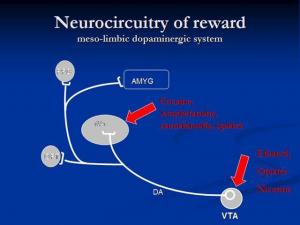Israeli scientists find way to erase memories of drug addiction

Overview
Originally Published: 06/17/2011
Post Date: 06/17/2011
by Dan Even
Attachment Files
Addiction Neuroscience Article | Israeli scientists find way to erase memories of drug addiction
Summary/Abstract
Israeli scientists have developed a method to erase memories associated with drug addiction, which could prove to be a breakthrough in preventing recidivism among rehabilitated addicts.
Content
Israeli scientists have developed a method to erase memories associated with drug addiction, which could prove to be a breakthrough in preventing recidivism among rehabilitated addicts. The Hebrew University researchers, led by Dr. Rami Yaka of the university's Institute of Drug Research, were seemingly able to erase the drug-linked memories of rats that had been deliberately administered cocaine over two weeks' time. The researchers injected a small protein - a peptide called ZIP - directly into an area of the addicted rats' basal forebrain called the nucleus accumbens, which controls pleasure and reward and which has been demonstrated to be connected to drug addiction. Afterward, the rats were returned to their pens to check their reactions. Rather than seeking out the place where they had been getting their "fixes" of cocaine, the rats ignored it, indicating that memories linked to their addiction had been erased. "One of the biggest problems with drug addicts is the high rate of those who return to drug use after being rehabilitated," explained Yaka. "Memories can trigger a desire for the drug, including memories of the drug itself, the needle or the environment in which the drug was consumed. "This research indicates the possibility of erasing these memories, in a way that will allow addicts to cancel the associations they have in their minds regarding the drug." The research is to be included in Hebrew University's presentation at next week's Facing Tomorrow 2011 conference in Jerusalem. The protein used has been found by other researchers over the past five years to inhibit learning processes by affecting memory. To date, however, all the memories erased have been short-term ones. This research provides evidence that the peptide can also erase memories acquired through a long-term learning process. Based on this research, Yaka said, it may be possible to erase memories in the course of treating other problems, such as post-traumatic stress disorder. While the current research dealt only with memories linked to cocaine, "All drugs follow the same addictive path, just at different intensities," Yaka said. "Cocaine, heroin and even cannabis stimulate the secretion in the brain of the hormone dopamine, which is associated with pleasure, at least in the first stages of addiction. Therefore, the substance that affected the memories of addiction to cocaine should have a similar influence on addictions to other substances." The research could provide a new treatment model for weaning people off drugs. Currently, the treatment of addicts relies primarily on administering alternative drugs, such as methadone, and psychological counseling. Medical research has previously demonstrated the counterintuitive fact that the longer an addict remains "clean" of drugs, the more likely he is to resume taking them, because of certain chemical changes that take place in the brain. "The treatment being examined in the current research tries to prevent the increased risk of returning to drugs by preventing some of these brain changes," Yaka said. The scientists are still unsure if the memory erasure process is selective, affecting only memories associated with drugs, or if other memories are erased as well. "Tests we've done show that the place [in the brain] where the substance was injected is connected solely to memories of pleasure and reward, and not to other memories," Yaka said. "We also found that after the injection of the substance, the rats' ability to accumulate new memories was not affected."





